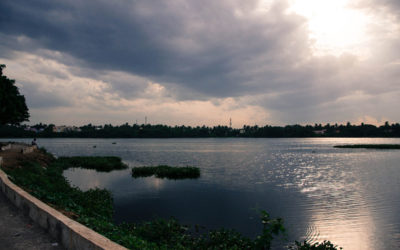River Yamuna ‘close to death’: New study warns Delhi’s waterway is ‘toxic’ even after treatment and should not be used for drinking or irrigation
A new study has revealed that the Yamuna River in Delhi has almost ‘died’ – and there are no signs of healing as even after treatment, the water remains toxic and unfit for any purpose.
The study, published in International Journal of Engineering Sciences & Research Technology, stated: “Even expensive water treatment technologies are incapable of treating the polluted river water. And, the conventional water processes based on chemical filtration and biological treatment are not suitable for removing the Total Dissolved Solids (TDS).”
Researchers collected and tested water samples from the Najafgarh drain, a nursing home drain out, the stream of the Yamuna near the Nizamuddin Bridge, Okhala barrage, and near the origin of Agra canal – all of which flow into the Yamuna.

A new study has revealed that the Yamuna River in Delhi has a status close to ‘dead’ – and there are no signs of healing as the water remains toxic even after treatment
The Yamuna River is a vital natural resource and the study also noted that an alarming amount of polluted water is supplied to the Agra canal for irrigating the agricultural lands of 638 villages.
“We investigated the impact of urban runoff on the water quality of the Yamuna River in Delhi, which flows into the Agra canal and is used for irrigation purposes.
“Results showed drastic variations in each of the water samples after treatment,” said R S Dubey, Department of Applied Chemistry, Amity University, Noida, the author of the study.
“Water pollution levels are higher by multiples than the limit prescribed by the pollution control authorities for irrigation. The water quality of Yamuna is polluted and not suitable for any other purposes,” he said.

Yamuna water is unusable for crop irrigation and should not be consumed, the study warned
Water samples were analysed for various physio-chemical parameters such as pH, total suspended solids (TSS), total dissolved solids (TDS), total hardness (TH), total alkalinity (TA), biological oxygen demand (BOD), chemical oxygen demand (COD), dissolved oxygen (DO), electrical conductivity (EC), chloride, sulphate, nitrate, toxic metals, and microbial population (MP) levels by following the standard method.
The water quality was good along areas where the river enters Delhi before the Wazirabad barrage.
While the optimum pH for river water is around 7.4, the study found that Mean pH of the Yamuna water varies from 7.5 to 11.8 at different sampling points.
Where BOD levels are high, DO levels decrease because the oxygen in the water is consumed by the bacteria.
“An experimental observation shows the DO as zero. The type of water in Delhi falls under ‘dead water quality’, thereby making it unfit for irrigation or any other domestic or industrial purpose,” said Dubey.
“Most of the rivers in the urban regions are the end points of waste water discharged from households and industries, which create major problem for river water quality management. The waste-water discharges contribute to significant river water degradation, reduce agricultural products quality, land fertility and ultimately affect public health,” said Dubey.
The study also found major groundwater pollution in the Yamuna riverbed.
The researchers have recommended industrial and untreated sewage waste to be checked immediately.
Commercial establishments on the Yamuna river bank must be monitored strictly by appropriate authorities, and they should change the present sewage treatment technology as soon as possible.




0 Comments